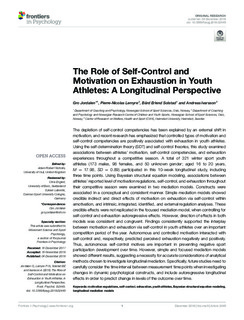| dc.contributor.author | Jordalen, Gro | |
| dc.contributor.author | Lemyre, Nicolas | |
| dc.contributor.author | Solstad, Bård Erlend | |
| dc.contributor.author | Ivarsson, Andreas | |
| dc.date.accessioned | 2019-01-04T10:06:12Z | |
| dc.date.available | 2019-01-04T10:06:12Z | |
| dc.date.created | 2018-11-30T13:33:53Z | |
| dc.date.issued | 2018 | |
| dc.identifier.citation | Frontiers in Physiology. 2018, 9, 2449 | nb_NO |
| dc.identifier.issn | 1664-1078 | |
| dc.identifier.uri | http://hdl.handle.net/11250/2579149 | |
| dc.description.abstract | The depletion of self-control competencies has been explained by an external shift in motivation, and recent research has emphasized that controlled types of motivation and self-control competencies are positively associated with exhaustion in youth athletes. Using the self-determination theory and self-control theories, this study examined associations between athletes’ motivation, self-control competencies, and exhaustion experiences throughout a competitive season. A total of 321 winter sport youth athletes (173 males, 98 females, and 50 unknown gender; aged 16 to 20 years, M = 17.98, SD = 0.89) participated in this 10-week longitudinal study, including three time points. Using Bayesian structural equation modeling, associations between athletes’ reported level of motivation regulations, self-control, and exhaustion throughout their competitive season were examined in two mediation models. Constructs were associated in a conceptual and consistent manner. Simple mediation models showed credible indirect and direct effects of motivation on exhaustion via self-control within amotivation, and intrinsic, integrated, identified, and external regulation analyses. These credible effects were not replicated in the focused mediation model, when controlling for self-control and exhaustion autoregressive effects. However, direction of effects in both models was consistent and congruent. Findings consistently supported the interplay between motivation and exhaustion via self-control in youth athletes over an important competition period of the year. Autonomous and controlled motivation interacted with self-control and respectively predicted perceived exhaustion negatively and positively. Thus, autonomous self-control motives are important in preventing negative sport participation development over time. However, simple and focused mediation models showed different results, suggesting a necessity for accurate considerations of analytical methods chosen to investigate longitudinal mediation. Specifically, future studies need to carefully consider the time interval between measurement time points when investigating changes in dynamic psychological constructs, and include autoregressive longitudinal effects in order to predict change in levels of the outcome over time. | nb_NO |
| dc.language.iso | eng | nb_NO |
| dc.subject | Bayesian structural equation modeling | |
| dc.subject | exhaustion | |
| dc.subject | longitudinal mediation models | |
| dc.subject | motivation regulations | |
| dc.subject | self-control | |
| dc.subject | youth athletes | |
| dc.title | The Role of Self-Control and Motivation on Exhaustion in Youth Athletes: A Longitudinal Perspective | nb_NO |
| dc.type | Journal article | nb_NO |
| dc.type | Peer reviewed | nb_NO |
| dc.description.version | publishedVersion | nb_NO |
| dc.rights.holder | © 2018 Jordalen, Lemyre, Solstad and Ivarsson. This is an open-access article distributed under the terms of the Creative Commons Attribution License (CC BY). The use, distribution or reproduction in other forums is permitted, provided the original author(s) and the copyright owner(s) are credited and that the original publication in this journal is cited, in accordance with accepted academic practice. No use, distribution or reproduction is permitted which does not comply with these terms. | nb_NO |
| dc.source.journal | Frontiers in Psychology | nb_NO |
| dc.identifier.doi | 10.3389/fpsyg.2018.02449 | |
| dc.identifier.cristin | 1637596 | |
| dc.description.localcode | Seksjon for coaching og psykologi / Deparment of Coaching and Psychology | nb_NO |
| cristin.unitcode | 150,32,0,0 | |
| cristin.unitname | Seksjon for coaching og psykologi | |
| cristin.ispublished | true | |
| cristin.fulltext | original | |
| cristin.qualitycode | 2 | |
